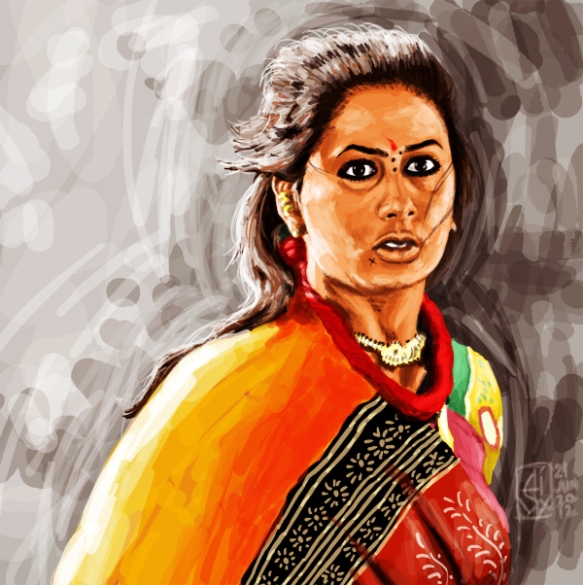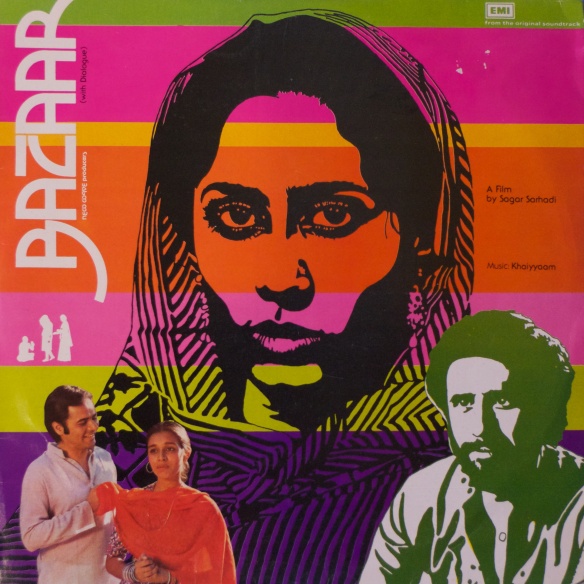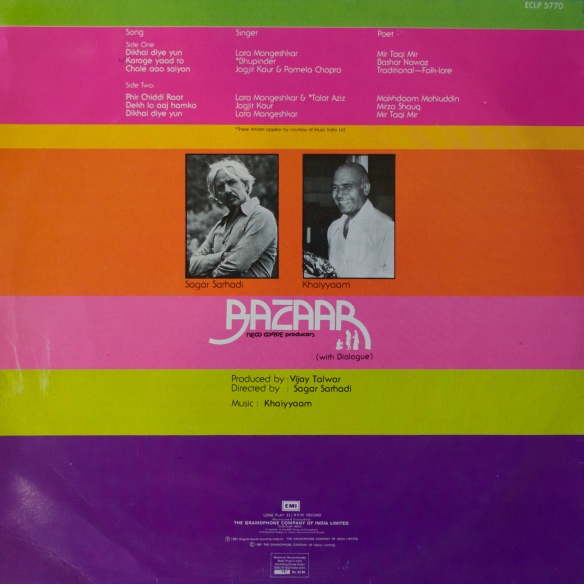Most film music from India is regarded as frothy, frivolous and sentimental. This is especially true of that music from the mid 70’s on, when ‘fun’, ‘dance’, ‘modern’ and ‘disco’ were the key themes. Bollywood is the Indian equivalent of bubblegum is the implied judgement of most ‘Critics’. As you can guess, I do not subscribe to that judgement. Or put it this way, I think there is room in everyone’s life for ‘sentiment’, ‘fun’ and ‘dance’.
In the late 70s an alternate cinema, called parallel cinema, developed and flourished for a short time. This cinema was Loved by the ‘Critics’. It dealt with themes of contemporary India such as corruption, domestic violence, police brutality and mental illness with honesty and often, with a rough brutalism. These films, almost to a one, were flops in India. Indeed, in the parlance of Bollywood they were ‘mega flops. They played to art houses and film festivals in Europe and the States but were completely unknown to Indian audiences.
Many wonderful actors and talented directors got their start in the parallel cinema: Om Puri, Naseerudin Shah, Smita Patil and Shabana Azmi. Some of them went on to star in mainstream films or films made in the West with South Asian characters. To the casual observer, the most obvious difference between parallel cinema and Bollywood, was the lack of song and dance. And that, no doubt, was probably why Indian audiences avoided the films like intercaste marriage.
Around this time a cinematic intercaste marriage took place which brought together the music, complete with the voices of India’s greatest playback singers like Lata Mangeshkar and Asha Bhosle, with the serious subject matter of parallel cinema. These were still not hugely popular productions but did attract small audiences within India itself. They appealed to middle class Indians who were somewhat embarrassed by the supposed gauche display of emotion, skin and violence in the mainline movies.
One of these films was Bazaar. Bazaar, as even the most untravelled person knows, means ‘market’. In the context of the film the broader meaning was the ‘market-driven’ attitude towards women, who were forced into unhappy domestic lives, often with older, brutish husbands, simply because the marriage made good economic sense for the bride’s family.
Najma and Salim are in love, but their’s is a platonic relationship, as Salim is a deep thinker and prefers that women like Najma be financially independent, and not be dependent on men. On the other hand, Sarju and Shabnam are in love, and would like to get married, however, Shabnam’s dad has finalized her marriage with a much older man, who is wealthy, and has shown an interest in Shabnam. An engagement ceremoney takes place with this older gentleman, and Shabnam. Sarju, though devastated, must now attempt to convince Shabnam’s dad, as well as Shabnam’s future husband, to change their respective minds, and let him marry Shabnam, with results that will change their lives forever.
The music from the film, which was composed by the great Khayyam is restrained and sensitive to the subject matter. Lyrics are written by some of Urdu’s most beloved poets. Bits of dialogue that set up the context of the song are included in the soundtrack as well.
Bazaar is certainly not the ‘best-in-show’ of this sort of film soundtrack but it is entirely solid and enjoyable. Lata is joined by some lesser known playback singers, namely, Bhupinder and Jagjit Kaur. Talat Aziz, one of India’s most popular ghazal artists also adds his lovely textured tone to the soundtrack as well.
Track List:
01 Dikhai Diye Yun
02 Karoge Yaad To
03 Chale Aao Saiyan
04 Phir Chiddi Raat
05 Dekh Lo Aaj Ham Ko
06 Dikhai Diye Yun (Reprise)



